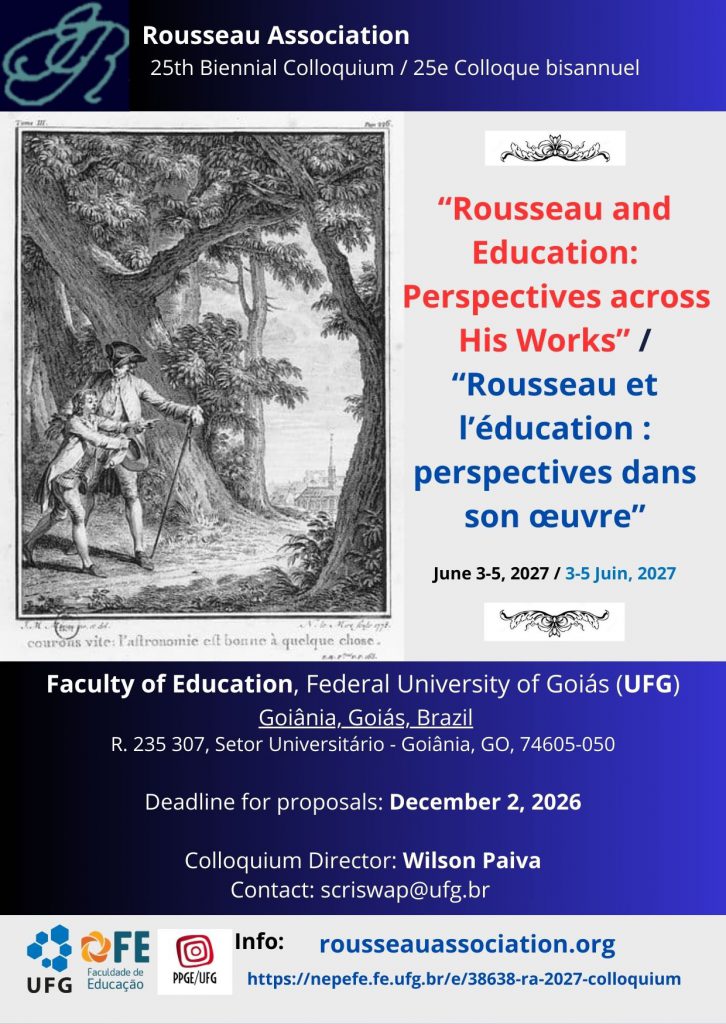25th Biennial RA Colloquium / 25e colloque bisannuel
“Rousseau and Education: Perspectives across His Works” /
“Rousseau et l’éducation : perspectives dans son œuvre”
Faculty of Education, Federal University of Goiás (UFG)
Goiânia, Goiás, Brazil /
Faculté d’Éducation de l’Université fédérale de Goiás (UFG)
Goiânia, GO (Brésil)
June 3-5, 2027 / 3-5 juin 2027
Colloquium Director: Wilson Paiva
Conference Website
Call for Papers/Appel à communications
Call for Papers
Rousseau Association 25th Biannual Colloquium
Rousseau and Education: Perspectives across His Works
Faculty of Education, Federal University of Goiás (UFG)
Goiânia, GO (Brazil)
June 3-5, 2027
Rousseau’s thought occupies a foundational place in the history of educational theory, yet its educational significance far exceeds the boundaries of Émile alone. Education in Rousseau permeates his moral philosophy, political theory, anthropology, aesthetics, reflections on language and music, autobiographical writings, and even his botanical and scientific practices. The 25th Biennial Colloquium of the Rousseau Association proposes to explore Rousseau on all educational perspectives, understood in the broadest and most interdisciplinary sense.
This colloquium invites scholars to reconsider education in Rousseau not only as a pedagogical project, but as a comprehensive framework for thinking about human formation (formation de l’homme), citizenship, sensibility, freedom, inequality, nature, culture, and modernity. Particular attention may be given to the tensions between education and society, nature and artifice, individuality and collectivity, autonomy and authority, as well as to the contemporary relevance of Rousseau’s educational thought in global and plural contexts.
We welcome proposals for 25-minute papers, in English or French, addressing (but not limited to) the following themes:
- Émile and its philosophical, political, and pedagogical interpretations
- Education and moral formation
- Political education, civic education, and republican virtue
- Education, nature, and anthropology
- Sensibility, affect, imagination, and education
- Language, music, and aesthetic education
- Gender, education, and the figure of Sophie
- Education, inequality, and social critique
- Rousseau and modern or contemporary educational theory
- Comparative perspectives on Rousseau’s educational legacy
- Educational practices, institutions, and utopias in Rousseau
- Education beyond pedagogy: autobiographical, literary, scientific, and material dimensions
In keeping with the tradition of the Rousseau Association, we encourage a wide diversity of disciplinary approaches, including philosophy, education, political theory, history, literature, musicology, anthropology, and related fields.
Proposals should include:
- Title
- Abstract (maximum 300 words)
- Short biography (maximum 150 words)
Please submit all materials in a single PDF document titled:
Name_RA2027_proposal.pdf, to scriswap@ufg.br by the deadline of December 2, 2026.
Further details regarding submission deadlines, registration, fee and accommodations will be announced in due course.
The colloquium will take place at the Faculty of Education of the Federal University of Goiás (UFG), located in Goiânia, a major cultural and academic center in central Brazil.
Appel à communications
25e Colloque bisannuel de l’Association Rousseau
Rousseau et l’éducation : perspectives dans son œuvre
Faculté d’Éducation de l’Université fédérale de Goiás (UFG)
Goiânia, GO (Brésil)
5-7 juin 2027
La pensée de Rousseau occupe une place fondatrice dans l’histoire de la théorie de l’éducation, mais sa portée éducative dépasse largement le cadre de l’Émile. Chez Rousseau, l’éducation traverse l’ensemble de l’œuvre : philosophie morale, théorie politique, anthropologie, esthétique, réflexions sur le langage et la musique, écrits autobiographiques, sans oublier ses pratiques botaniques et scientifiques. Le 25e Colloque bisannuel de l’Association Rousseau se propose d’examiner Rousseau sous toutes les perspectives éducatives, entendues dans leur sens le plus large et interdisciplinaire.
Ce colloque invite à repenser l’éducation chez Rousseau non seulement comme un projet pédagogique, mais comme un cadre global de réflexion sur la formation de l’homme, la citoyenneté, la sensibilité, la liberté, l’inégalité, la nature, la culture et la modernité. Une attention particulière pourra être accordée aux tensions entre éducation et société, nature et artifice, individualité et collectivité, autonomie et autorité, ainsi qu’à l’actualité de la pensée éducative de Rousseau dans des contextes contemporains, globaux et pluriels.
Nous attendons des propositions de communications de 25 minutes, en français ou en anglais, portant notamment (mais non exclusivement) sur les axes suivants :
- Émile et ses interprétations philosophiques, politiques et pédagogiques
- Éducation et formation morale
- Éducation politique, civique et vertu républicaine
- Éducation, nature et anthropologie
- Sensibilité, affect, imagination et éducation
- Langage, musique et éducation esthétique
- Genre, éducation et la figure de Sophie
- Éducation, inégalité et critique sociale
- Rousseau et les théories éducatives modernes ou contemporaines
- Perspectives comparées sur l’héritage éducatif de Rousseau
- Pratiques éducatives, institutions et utopies chez Rousseau
- L’éducation au-delà de la pédagogie : dimensions autobiographiques, littéraires, scientifiques et matérielles
Conformément à la tradition de l’Association Rousseau, nous encourageons la plus grande diversité d’approches disciplinaires : philosophie, sciences de l’éducation, théorie politique, histoire, littérature, musicologie, anthropologie, entre autres.
Les propositions devront comprendre :
- Un titre
- Un résumé (maximum 300 mots)
- Une courte notice biographique (maximum 150 mots)
Les propositions devront être envoyées en un seul document PDF intitulé :
Nom_RA2027_proposal.pdf, à scriswap@ufg.br avant la date limite du 2 décembre 2026.
Les informations complémentaires concernant les dates limites, l’inscription, les frais et l’hébergement seront communiquées ultérieurement.
Le colloque se tiendra à la Faculté d’Éducation de l’Université fédérale de Goiás (UFG), à Goiânia, importante ville universitaire et culturelle du centre du Brésil.



